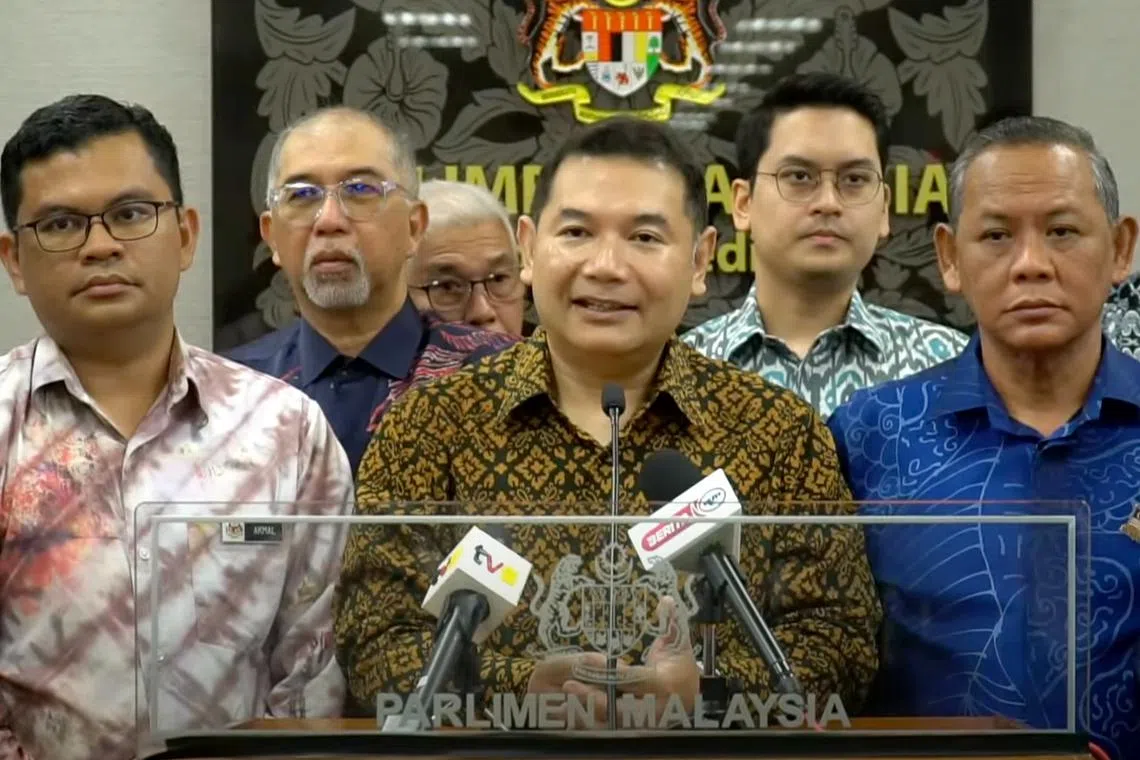Attack on my son is a ‘warning’ to silence me, says Malaysian MP Rafizi Ramli
Sign up now: Get insights on the biggest stories in Malaysia

Former Malaysian Cabinet minister Rafizi Ramli (centre) said the attack was “a warning to me not to speak out on certain issues”.
PHOTO: PARLIMEN MALAYSIA/YOUTUBE
Follow topic:
- MP Rafizi Ramli's 12-year-old son was attacked with a syringe by an unknown assailant, prompting police investigation and medical observation.
- The attack shocked Malaysians because politically linked physical attacks are rare, despite the rough-and-tumble nature of domestic politics.
- Political figures on both sides condemned the attack, with Mr Rafizi vowing to continue his duties.
AI generated
KUALA LUMPUR – The wife of former Malaysian Cabinet minister Rafizi Ramli received two chilling messages just hours after a shocking attack on their son on Aug 13 in broad daylight.
One of the WhatsApp messages read: “Diam! Andai teruskan, Aids!” (Shut up! If you continue, Aids!) It was followed by three syringe emojis.
The MP from Parti Keadilan Rakyat (PKR), which leads Malaysia’s governing coalition, said the attack on his family
“While I will take steps to enhance security measures, I will not bow to any threats and will continue to carry out my duties as usual,” Datuk Seri Rafizi, 47, said at a press conference on Aug 14 at the Parliament lobby, surrounded by several PKR lawmakers.
He has been using a weekly podcast and social media postings to lash out on corruption and governance issues in the last few weeks, after resigning as economy minister in May
The brazen attack on his 12-year-old son, carried out at about 1.45pm at a mall carpark in Putrajaya equipped with CCTV cameras, sent Malaysia reeling. This is because politically linked physical attacks are rare, despite the rough-and-tumble nature of domestic politics and it is even more alarming this time as it involves a child.
Professor Kartini Aboo Talib, a lecturer at Universiti Kebangsaan Malaysia, told The Straits Times: “Blood in politics has been here for quite some time. However, violent attacks targeting young children... this is the first time ever.”
She was referring to the murder of a political rival in the 1980s by former Cabinet minister Mokhtar Hashim, the gruesome death of politician Mazlan Idris at the hands of bomoh Mona Fandey in 1993, and the unresolved killing in 2004 of Sabah lawmaker Norjan Khan Bahadar.
Malaysians are up in arms over the tragic death of a 13-year-old Sabah student on July 17,
In the attack on Mr Rafizi’s son, the boy and his mother were getting into their car to leave the shopping centre when he was grabbed by an unknown assailant and jabbed with a syringe.
CCTV footage showed that two men on a motorcycle had been trailing the car of Mr Rafizi’s wife. The duo were dressed entirely in black and wore full-face helmets. “They had waited earlier and rushed to attack my son at the right moment,” Mr Rafizi said in a statement on Aug 13.
His son was immediately taken to a nearby hospital for treatment. Police arrived at the scene shortly after the incident. The boy’s condition is stable and doctors are trying to ascertain the contents of the syringe, he said.
“It could be poison, drugs or viruses such as HIV, or just water. The process to find out what was injected into my son will take a few months, but the first 24 hours are critical,” he said.
“He will need to do blood tests for the next six months until we can confirm that he is safe. Currently, he is under observation and he is not showing any symptoms. As a father, I think we can rule out poison,” he added, saying his son is in good spirits.
Mr Rafizi, through his social media platforms, has alleged that several well-known figures were involved in possible graft and urged the government to carry out investigations.
Known for his tough stance against corruption during his two decades as an opposition politician, he had largely kept quiet on corruption and governance issues in the past two years as he was a member of the Cabinet led by Prime Minister Anwar Ibrahim.
But he began to speak out openly again after resigning from his Cabinet post, shortly after losing PKR’s deputy presidency
Mr Rafizi told the news conference that the attack on his only child occurred a few days after he met a group of whistle-blowers over a scandal, which he declined to detail.
“This is a message telling me to back off. Last week, there was a group of whistle-blowers who came to see me about a scandal. The culprit behind this attack knows that once I find a scandal, I will dig and dig and dig,” he said.
Datuk Seri Anwar on Aug 14 condemned the syringe attack as part of a “worrying and harmful” trend in the country, and said a thorough and transparent investigation would be carried out.
“I would like to express my sadness as we’re seeing an extreme and harmful culture. We are seeing issues of bullying and now, the child of a Member of Parliament has been targeted.”
The opposition is also standing with Mr Rafizi.
Opposition coalition Perikatan Nasional’s chief whip Takiyuddin Hassan said in a statement on Aug 13 that what happened was a criminal act completely unacceptable in a civilised country.
“If it is true that the attack is a warning to stop Mr Rafizi from speaking out on certain matters, then this incident signals thuggish political behaviour that is a threat to the country’s democracy.
“Political differences should never be translated to threats and physical violence, especially when it involves children,” he said.
Singapore Institute of International Affairs senior fellow Oh Ei Sun said: “The real question is perhaps which particular parties are sending out such a warning, as Mr Rafizi has revealed many scandals in his political career, perhaps inadvertently stepping on many toes.”


